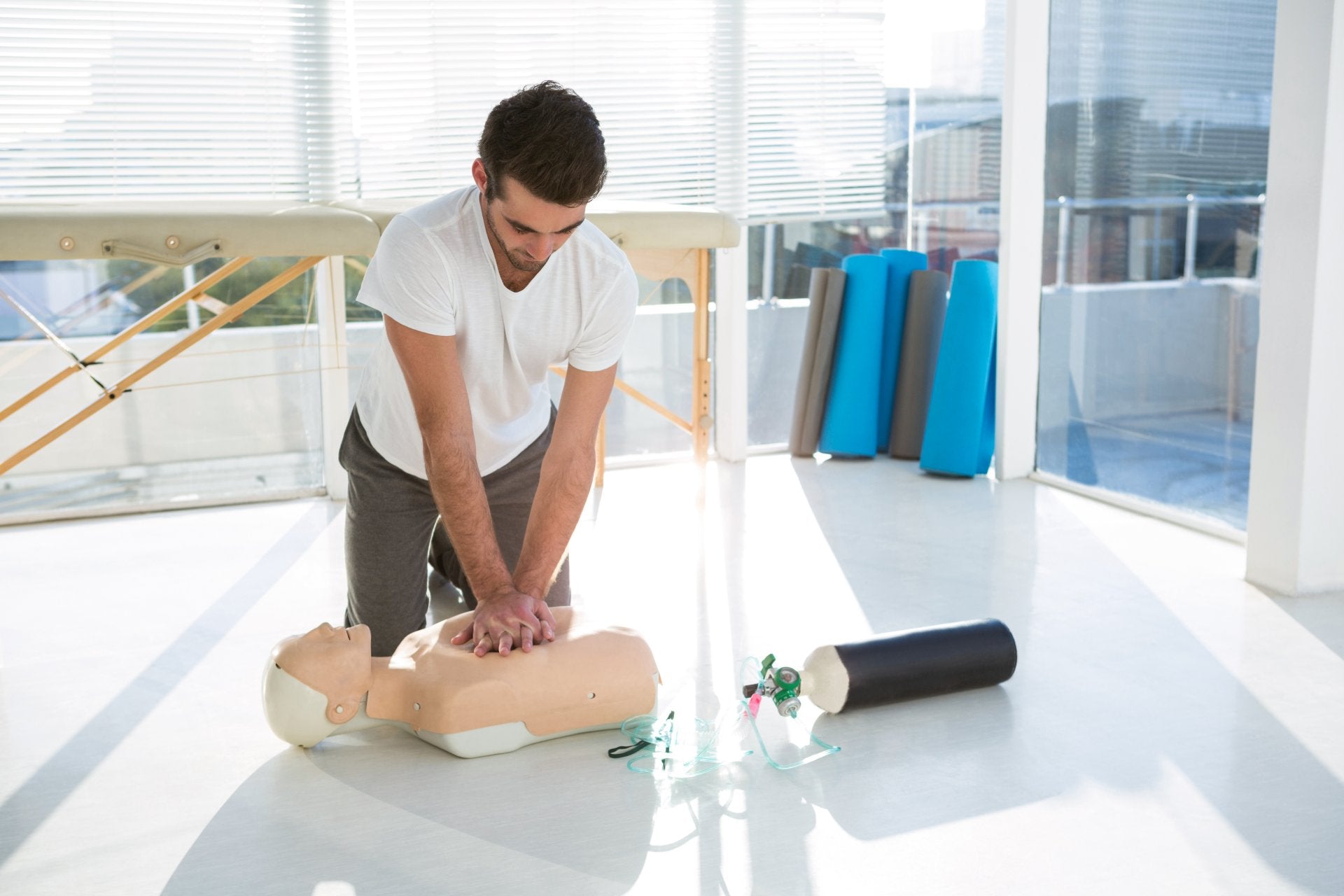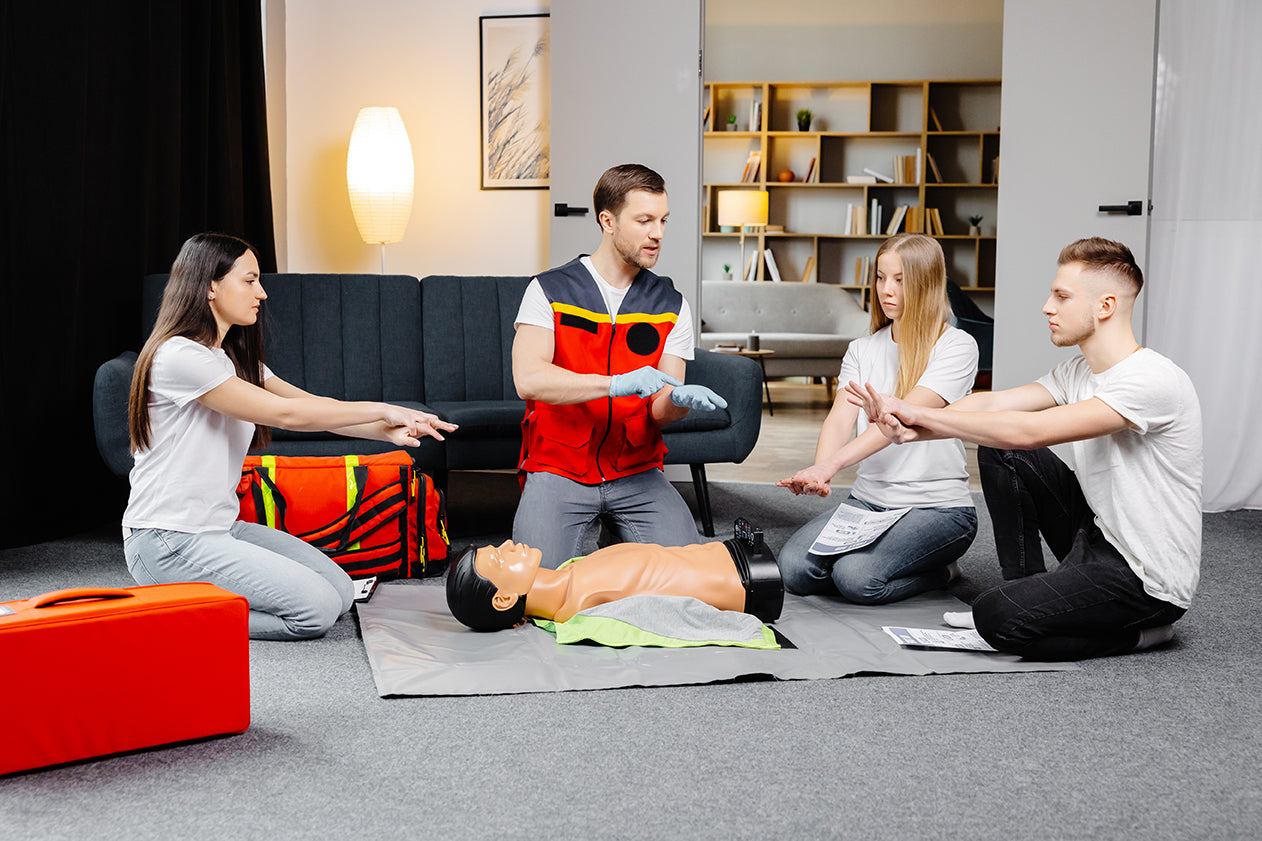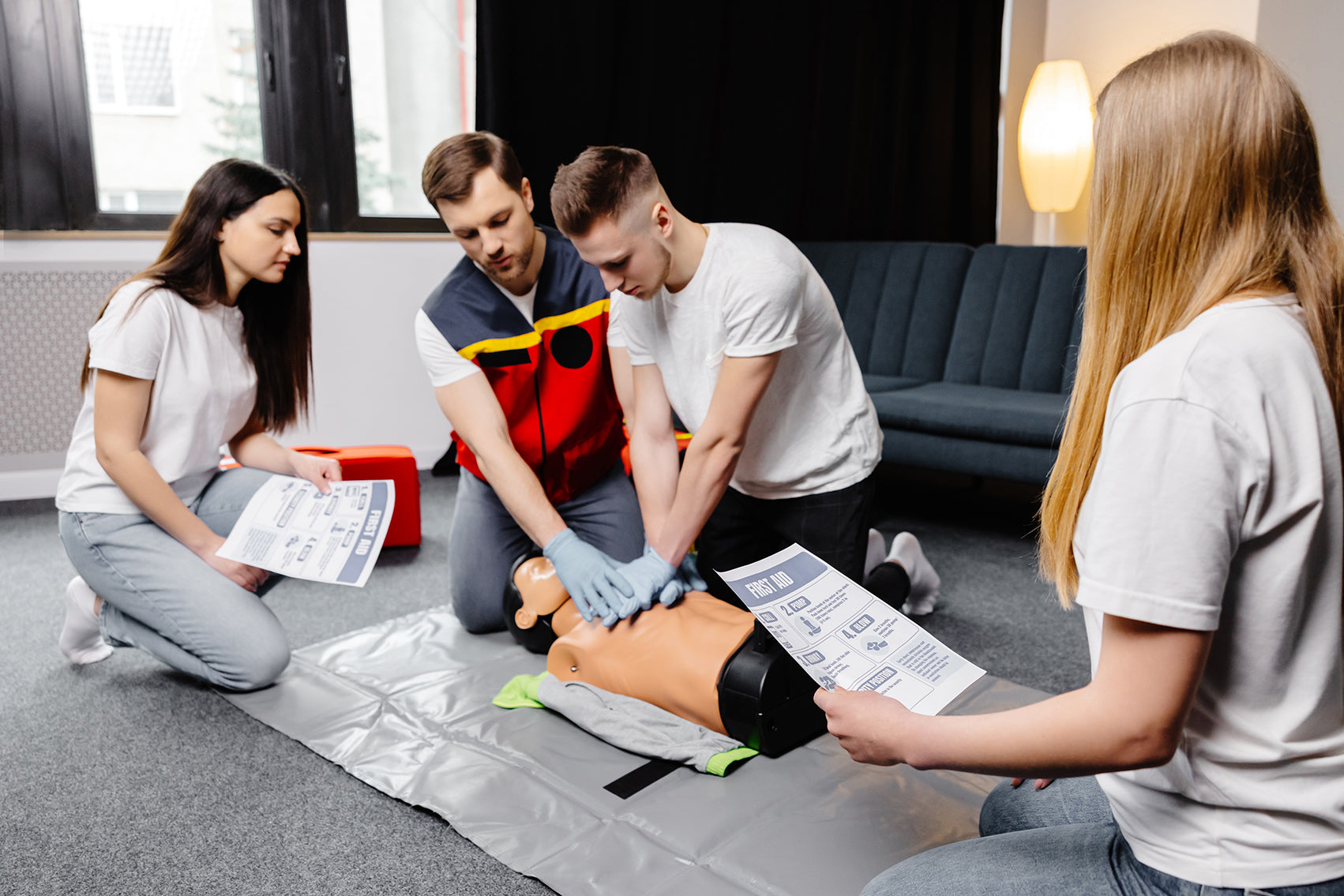You have no items in your shopping basket.
Book classroom basic life support training courses
Classroom basic life support training courses with The Mandatory Training Group: More than just a certificate
Anna Nova Galeon
27-09-2024
In healthcare and social care, being prepared for emergencies isn't just an expectation - it's a responsibility. Whether you're a healthcare professional, educator, or caregiver, knowing how to perform Basic Life Support (BLS) can make the difference between life and death. At The Mandatory Training Group, we offer weekly refresher classroom-based resuscitation courses at our training centres in London, Coventry, and Manchester. These sessions cover both adult and paediatric BLS, equipping you with the skills and confidence to respond effectively in emergencies.
In this blog, Anna will explore the importance of BLS training, debunk some common myths, and highlight why attending a classroom session with us goes beyond just earning a certificate. We'll also share some compelling statistics that underscore the critical need for proper resuscitation training.
The importance of basic life support (BLS) training
What is BLS?
Basic Life Support (BLS) refers to a set of clinical interventions used to sustain life in emergencies, such as cardiac arrest, respiratory distress, or choking, until advanced medical care is available. BLS focuses on maintaining airway patency, supporting breathing and circulation, and recognising life-threatening emergencies.
Why is BLS training crucial?
Statistics show that in the UK, around 30,000 out-of-hospital cardiac arrests occur each year, with a survival rate of less than 10%. Immediate intervention with CPR (Cardiopulmonary Resuscitation) can double or even triple a victim’s chances of survival. For healthcare professionals and social care providers, being proficient in BLS is not just a professional requirement but a societal imperative.

Image by LightFieldStudios via Envato Elements

Image by Rawpixel via Envato Elements
Key facts and statistics
- Cardiac arrest and heart attacks - Cardiac arrest is a leading cause of death in the UK. Every minute without CPR and defibrillation reduces the chance of survival by 10%.
- Paediatric resuscitation - Around 5,000 children die each year from sudden cardiac arrest in the UK. Knowing how to perform paediatric BLS can save a child's life.
- CPR awareness - According to the British Heart Foundation, nearly 60% of UK adults feel helpless during a cardiac emergency because they lack the necessary training.
- Timely intervention - Bystander CPR can double the survival rate, but only 32% of out-of-hospital cardiac arrest victims receive CPR from a bystander.
Debunking common myths about BLS training
- "I've been trained once; I don’t need a refresher."
- Reality: BLS skills can deteriorate over time. The Resuscitation Council UK recommends refresher training at least annually to maintain proficiency.
- "BLS is only for healthcare professionals."
- Reality: BLS is vital for anyone who might encounter an emergency situation, including teachers, childcare providers, and even the general public.
- "I'll never be in a situation to use these skills."
- Reality: Emergencies are unpredictable. Being prepared means you can act confidently when it matters most, whether in your workplace or community.
What sets The Mandatory Training Group apart?
At The Mandatory Training Group, our BLS training is about more than just ticking a box. Here’s why our courses are the preferred choice for many healthcare and social care professionals:

Image by DC_Studio via Envato Elements

Image by LightFieldStudios via Envato Elements
Make the most of your BLS training
- Attend regular refresher courses - Even if you’ve completed BLS training before, annual refresher courses are crucial to maintain your skills.
- Practice regularly - If you have access to a training manikin, practice CPR techniques to keep your skills sharp.
- Engage with the content - Don’t just aim to pass the course. Engage with the material, ask questions, and participate actively to gain the most from the experience.
- Consider group training - If you're an employer, consider booking an in-house training session for your team. This ensures compliance and fosters a shared understanding of emergency procedures.
More than a certificate - It’s about competence
At The Mandatory Training Group, we believe that BLS training should be about more than just earning a certificate. It’s about equipping healthcare professionals and others with the confidence and skills to respond to emergencies effectively. Our training sessions go beyond the basics, providing a comprehensive understanding of BLS procedures for adults and children.

Image by LightFieldStudios via Envato Elements

Image by nazariykarkhut via Envato Elements
Ready to advance your life-saving skills?
Don't wait for an emergency to highlight the importance of being prepared. Register now for our next Basic Life Support training session in London, Coventry, or Manchester and benefit from same-day certification, flexible options, and accredited training.
Book your face-to-face resuscitation course today and be ready to respond when it matters most.
Attending our BLS courses means you’re not just earning a certificate - you’re gaining the skills and confidence to make a real difference. Join us at The Mandatory Training Group and be part of a community committed to excellence in life-saving training.
In healthcare and social care, being prepared for emergencies isn't just an expectation - it's a responsibility. Whether you're a healthcare professional, educator, or caregiver, knowing how to perform Basic Life Support (BLS) can make the difference between life and death. At The Mandatory Training Group, we offer weekly refresher classroom-based resuscitation courses at our training centres in London, Coventry, and Manchester. These sessions cover both adult and paediatric BLS, equipping you with the skills and confidence to respond effectively in emergencies.
In this blog, Anna will explore the importance of BLS training, debunk some common myths, and highlight why attending a classroom session with us goes beyond just earning a certificate. We'll also share some compelling statistics that underscore the critical need for proper resuscitation training.
The importance of basic life support (BLS) training

Image by LightFieldStudios via Envato Elements
What is BLS?
Basic Life Support (BLS) refers to a set of clinical interventions used to sustain life in emergencies, such as cardiac arrest, respiratory distress, or choking, until advanced medical care is available. BLS focuses on maintaining airway patency, supporting breathing and circulation, and recognising life-threatening emergencies.
Why is BLS training crucial?
Statistics show that in the UK, around 30,000 out-of-hospital cardiac arrests occur each year, with a survival rate of less than 10%. Immediate intervention with CPR (Cardiopulmonary Resuscitation) can double or even triple a victim’s chances of survival. For healthcare professionals and social care providers, being proficient in BLS is not just a professional requirement but a societal imperative.
Key facts and statistics

Image by Rawpixel via Envato Elements
- Cardiac arrest and heart attacks - Cardiac arrest is a leading cause of death in the UK. Every minute without CPR and defibrillation reduces the chance of survival by 10%.
- Paediatric resuscitation - Around 5,000 children die each year from sudden cardiac arrest in the UK. Knowing how to perform paediatric BLS can save a child's life.
- CPR awareness - According to the British Heart Foundation, nearly 60% of UK adults feel helpless during a cardiac emergency because they lack the necessary training.
- Timely intervention - Bystander CPR can double the survival rate, but only 32% of out-of-hospital cardiac arrest victims receive CPR from a bystander.
Debunking common myths about BLS training
- "I've been trained once; I don’t need a refresher."
- Reality: BLS skills can deteriorate over time. The Resuscitation Council UK recommends refresher training at least annually to maintain proficiency.
- "BLS is only for healthcare professionals."
- Reality: BLS is vital for anyone who might encounter an emergency situation, including teachers, childcare providers, and even the general public.
- "I'll never be in a situation to use these skills."
- Reality: Emergencies are unpredictable. Being prepared means you can act confidently when it matters most, whether in your workplace or community.
What sets The Mandatory Training Group apart?

Image by DC_Studio via Envato Elements
At The Mandatory Training Group, our BLS training is about more than just ticking a box. Here’s why our courses are the preferred choice for many healthcare and social care professionals:
Make the most of your BLS training

Image by LightFieldStudios via Envato Elements
- Attend regular refresher courses - Even if you’ve completed BLS training before, annual refresher courses are crucial to maintain your skills.
- Practice regularly - If you have access to a training manikin, practice CPR techniques to keep your skills sharp.
- Engage with the content - Don’t just aim to pass the course. Engage with the material, ask questions, and participate actively to gain the most from the experience.
- Consider group training - If you're an employer, consider booking an in-house training session for your team. This ensures compliance and fosters a shared understanding of emergency procedures.
More than a certificate - It’s about competence

Image by LightFieldStudios via Envato Elements
At The Mandatory Training Group, we believe that BLS training should be about more than just earning a certificate. It’s about equipping healthcare professionals and others with the confidence and skills to respond to emergencies effectively. Our training sessions go beyond the basics, providing a comprehensive understanding of BLS procedures for adults and children.
Ready to advance your life-saving skills?

Image by nazariykarkhut via Envato Elements
Don't wait for an emergency to highlight the importance of being prepared. Register now for our next Basic Life Support training session in London, Coventry, or Manchester and benefit from same-day certification, flexible options, and accredited training.
Book your face-to-face resuscitation course today and be ready to respond when it matters most.
Attending our BLS courses means you’re not just earning a certificate - you’re gaining the skills and confidence to make a real difference. Join us at The Mandatory Training Group and be part of a community committed to excellence in life-saving training.
About the author
Dr Richard Dune

With over 20 years of experience, Richard blends a rich background in NHS, the private sector, academia, and research settings. His forte lies in clinical R&D, advancing healthcare tech, workforce development and governance. His leadership ensures regulatory compliance and innovation align seamlessly.
About the author
Anna Nova Galeon
Anna, our wordsmith extraordinaire, plays a pivotal role in quality assurance. She collaborates seamlessly with subject matter experts and marketers to meet stringent quality standards. Her linguistic precision and meticulous attention to detail elevate our content, ensuring prominence, clarity, and alignment with global quality benchmarks.

About the author
Anna Nova Galeon
Anna, our wordsmith extraordinaire, plays a pivotal role in quality assurance. She collaborates seamlessly with subject matter experts and marketers to meet stringent quality standards. Her linguistic precision and meticulous attention to detail elevate our content, ensuring prominence, clarity, and alignment with global quality benchmarks.

Related blog articles
View allContact us
Complete the form below to start your ComplyPlus trial and transform your regulatory compliance solutions.







